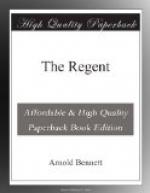Isabel Joy jumped up.
“Are you another of them, then?” she muttered. “I did think from the look of you that you would know a gentlewoman when you met one! Did you imagine for the thousandth part of one second that I would stoop—”
“Stoop!” exclaimed Edward Henry. “My theatre is not a music-hall—”
“You want to make it into one!” she stopped him.
“Good day to you,” she said. “I must face those journalists again, I suppose. Well, even they—! I came alone in order to avoid them. But it was hopeless. Besides, is it my duty to avoid them—after all?”
It was while passing through the door that she uttered the last words.
“Where is she?” Seven Sachs inquired, entering.
“Fled!” said Edward Henry.
“Everything all right?”
“Quite!”
Mr. Rentoul Smiles came in.
“Mr. Smiles,” said Edward Henry, “did
you ever photograph Sir John
Pilgrim?”
“I did, on his last visit to New York. Here you are!”
He pointed to his rendering of Sir John.
“What did you think of him?”
“A great actor, but a mountebank, sir.”
During the remainder of the afternoon Edward Henry saw the whole of New York, with bits of the Bronx and Yonkers in the distance, from Seven Sachs’s second automobile. In his third automobile he went to the theatre and saw Seven Sachs act to a house of over two thousand dollars. And lastly he attended a supper and made a speech. But he insisted upon passing the remainder of the night on the Lithuania. In the morning Isabel Joy came on board early and irrevocably disappeared into her berth. And from that moment Edward Henry spent the whole secret force of his individuality in fervently desiring the Lithuania to start. At two o’clock, two hours late, she did start. Edward Henry’s farewells to the admirable and hospitable Mr. Sachs were somewhat absent-minded, for already his heart was in London. But he had sufficient presence of mind to make certain final arrangements.
“Keep him at least a week,” said Edward Henry to Seven Sachs, “and I shall be your debtor for ever and ever.”
He meant Carlo Trent, still bedridden.
As from the receding ship he gazed in abstraction at the gigantic inconvenient word—common to three languages—which is the first thing seen by the arriving, and the last thing seen by the departing, visitor, he meditated:
“The dearness of living in the United States has certainly been exaggerated.”
For his total expenses, beyond the confines of the quay, amounted to one cent, disbursed to buy an evening paper which had contained a brief interview with himself concerning the future of the intellectual drama in England. He had told the pressman that “The Orient Pearl” would run a hundred nights. Save for putting “The Orient Girl” instead of “The Orient Pearl,” and two hundred nights instead of one hundred nights, this interview was tolerably accurate.




